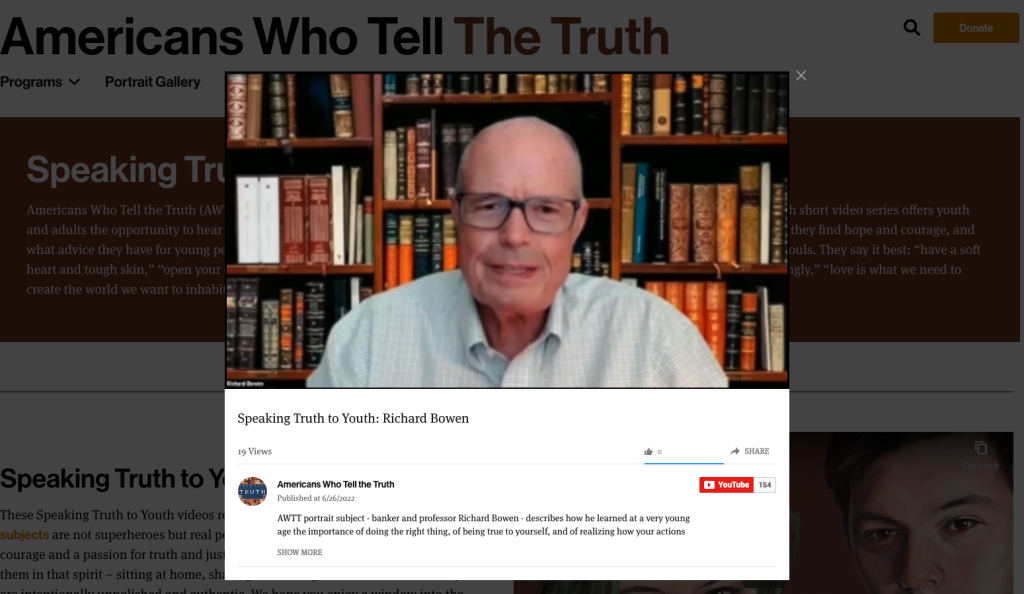
I have previously posted about the esteemed Robert Shetterly painting my portrait for his Americans Who Tell the Truth (AWTT) gallery, and being included as one of only seventeen whistleblowers honored.
And recently I was asked to participate in AWTT’s Speaking Truth to Youth video series, which, in their words, “reflect AWTT’s belief that our portrait subjects are not superheroes but real people whose work is driven by moral courage and a passion for truth and justice.”
In the short discussion, I shared how my sister and I grew up with a strong sense of right and wrong, “With the complete expectation that we would always do what was right. And when we didn’t do what was right, we suffered the consequences.”
That accountability could take several forms, and spanking was more often than not involved at that time. But what stuck with me more than corporal punishment were the realizations that came from seeing what came from our actions.
I shared a story about a young, maybe four- or five-year-old me, playing with matches. I knew I wasn’t supposed to, but I was out in a field and playing with matches. Well, that field caught fire, of course, and instead of getting my mother, I ran way. When my mother found out, I was punished, of course. But the lessons I took away from that day weren’t just not to play with matches. I learned that 1) you always do what is right, because when you don’t do what is right someone can be hurt by those actions. And 2) Harm will happen when you don’t do things that are right.
And that’s pretty concerning to me, because in today’s environment, people often do what is best for them, personally, rather than what is right. And they don’t seem to care about the harm they cause. People don’t have a sense of what is right and what is wrong, what is selfish, and what will not do harm to others. I’m convinced a lot of our troubles we are experiencing in today’s environment are due to the fact that people don’t know how to make ethical decisions. They’ve never been exposed to that before.
Yes, be true to yourself, but also be conscious of what actions can be taken and how they will impact others. I’ve seen firsthand that there can be tremendous damage done to the economy and done to individuals with unethical decision making. If we can get back to accountability and trusting everyone to leave this place a little bit better off than we found it, we might be able to reduce the harm we do in the world.
Think through the decisions you are making and assess the wider impact of those decisions. And no matter what else happens, don’t allow yourself to become involved in unethical situations. Because when you are involved, all of a sudden, you are contributing to the circumstances that cause harm to others. There will be consequences to every decision. We just have to decide which consequences we can live with, and which ones we want to avoid.

 Richard Bowen is widely known as the Citigroup whistleblower. As Business Chief Underwriter for Citigroup during the housing bubble financial crisis meltdown, he repeatedly warned Citi executive management and the board about fraudulent behavior within the organization. The company certified poor mortgages as quality mortgages and sold them to Fannie Mae, Freddie Mac and other investors.
Richard Bowen is widely known as the Citigroup whistleblower. As Business Chief Underwriter for Citigroup during the housing bubble financial crisis meltdown, he repeatedly warned Citi executive management and the board about fraudulent behavior within the organization. The company certified poor mortgages as quality mortgages and sold them to Fannie Mae, Freddie Mac and other investors.

